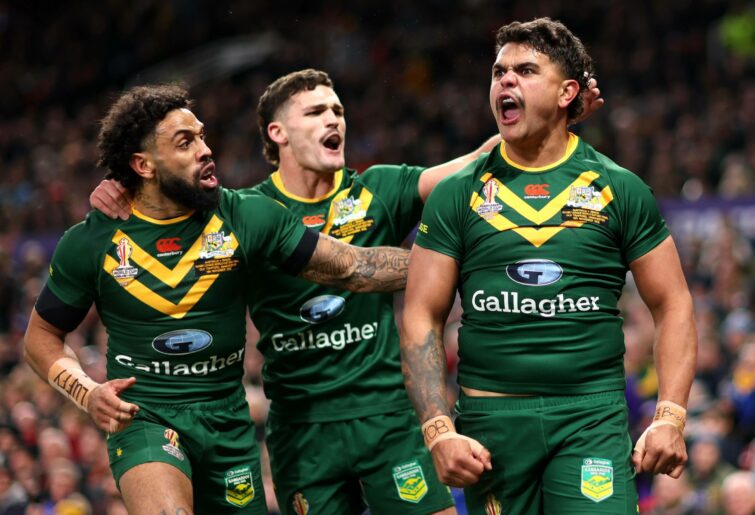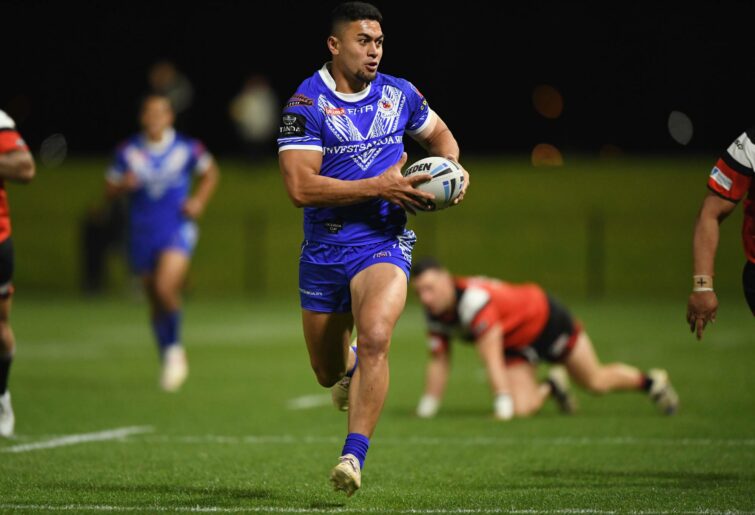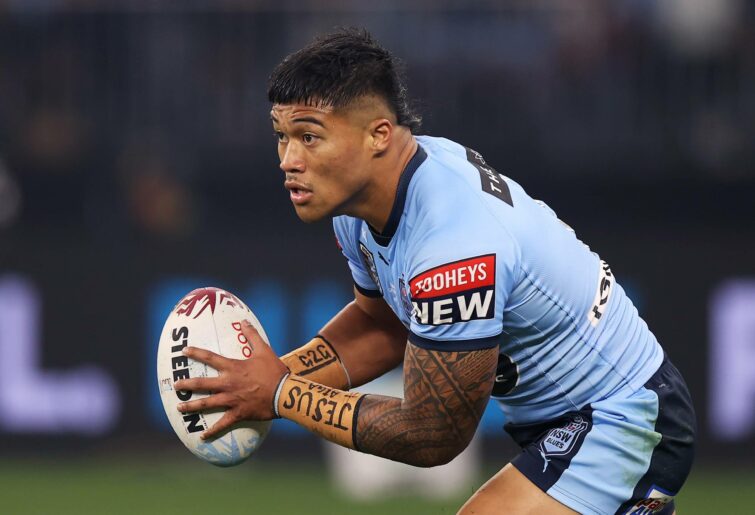Samoa should be immensely proud of their momentous World Cup, a campaign that included making the final and an historic first-ever win over a Tier 1 nation, beating England 27-26 in the semi-final.
But anyone using this fantastic run, which ultimately ended in a 30-10 loss at the hands of the three-time-consecutive World Champions Australia, as an argument for promoting the tiny nation into international rugby league’s top level are kidding themselves.
I’m not seeking to diminish what was the most exciting part of the tournament – Samoa rescued the whole thing from being a bit of a wash.
But let’s put their efforts into perspective.
Samoa recorded wins over Greece, France, Tonga and England.
This is not a period of continued success that has inevitably blossomed into a maiden berth in a World Cup final, it’s two wins that were to be expected, one that should have been considered a 50-50 proposition, and one upset victory.
And these wins were bookended with a 60-6 hiding by England and a 30-10 loss to the cruise-control Kangaroos.

(Photo by Naomi Baker/Getty Images)
Keeping that in mind, any calls for Samoa to be made a top-tier nation can be summed up as: “Samoa have beaten England once. Ever. Therefore they are to be considered equal to Australia and New Zealand.”
The very superlatives used in the opening stanza of this piece – ‘momentous’ and ‘historic’ – are entirely called for, yet they are also reminders of how early this success is for Samoa.
Which, again, is fantastic for Samoa and for international rugby league. It’s evidence that the current system of tiers is working.
But ‘working’ is the operative word. We’re dealing with the present tense, not past.
It hasn’t worked.
To act like Samoa having a decent crack at one tournament means they’re ready to be considered on the same level as the Kangaroos and Kiwis is wildly premature.
This is a squad that, it was revealed in February 2021, wrote a letter to the prime minister of the country asking for current head coach Matt Parish to be replaced.
A team that is so lacking in depth that retiring half Chanel Harris-Tavita started at hooker, after Danny Levi and Fa’amanu Brown couldn’t play. And with no disrespect intended to the latter two, neither of them will be the first choice (or, probably, second) in that position at their NRL clubs in 2023.
Samoa’s heart, effort and passion are unquestionable. Their depth – in both the playing and coaching ranks – is clearly in question.
Samoa are not ready for Tier 1. Not yet.

(Photo by Kai Schwoerer/Getty Images)
Rugby league’s tiers are a great system for the present state of the international game. I’ll admit at this point that I’m possibly a bit biased because I was an early proponent of the tiers.
In 2011, I wrote a piece in which I put forward an international system whereby people could represent the nation of their heritage and still be eligible for Australia, New Zealand or England:
As long as there are the two distinct tiers of rugby league playing nations, national eligibility should also be divided into two tiers.
A player elects to represent one of the top tier nations by playing a senior game for them and that shall be the only top tier nation said player will be allowed to represent for the length of their career…
But a player should be allowed to nominate a second tier nations to represent…
If they are not selected to play for their top tier nation, they can instead play for their second tier nation without having to wait for two years or a world cup before being ruled eligible to represent their top tier nation again.
I won’t go into it too much further, but I thought the following par was particularly prescient:
“Could you imagine the scenes in Port Moresby if the Kumuls got a win against the Kangaroos with Nev Costigan leading the way?”
Replace Costigan with Jason Taumalolo and you’ve got what we saw with Tonga in 2017 and ‘19.
(And no, despite that piece being published years before the current system was implemented, I’ve not yet received a cheque for my role as the architect.)
International rugby league is growing, which can be put down pretty much entirely to more nations being competitive.
But how competitive are these growing nations going to be if their players are asked to choose between their nation of heritage and their state of origin?
As for people who think rugby league’s somewhat rubbery eligibility rules are embarrassing or that a player can’t be passionate about an Australian state and a different nation, I point to Brian To’o.
Perhaps my favourite rugby league ambassador, To’o is as Penrith and NSW as they come, but his nose-to-nose performance of the Siva Tau and pointing to the strapping on his arm (which, if my ageing eyes are to be believed, read “for our people”) after scoring a try in the final show he’s also Samoan through and through.
A proud son of western Sydney and of Samoa. It’s really not that hard to wrap your head around.
And while ‘Bizza’ (or ‘bizzzaa_’ as he spells it on Insta, with the underscore there to help differentiate himself from all the other people who spell it with three Zs and two As) would have been a walk-up start for the Aussies, Mal Meninga managed to get by with Josh Addo-Carr and Val Holmes on his wings.
That was the case across the park, Australia having an embarrassment of riches in every position, so when the likes of To’o, Jarome Luai, Joseph Suaalii and Junior Paulo declared for their heritage rather than citizenship, the Aussies didn’t miss a beat.

(Photo by Mark Kolbe/Getty Images)
Take that option away though and while I’m sure some would still select Samoa over state, their depth would be further tested, guaranteeing their future World Cups would be far less successful.
As for the other side of the coin, that it’s time for State of Origin eligibility to be further opened up, I’m not entirely opposed.
Those who want to play for England or New Zealand but lived in NSW or Queensland prior to the age of 13 – which decides which state you can play for – could perhaps play Origin and for a top-tier country besides Australia.
But what problem does this really solve? How many Kiwi and English players would be in a position to take advantage of this system were it put in place?
And Australia would have a reasonable argument to fight this system. Optics-wise, they would look greedy fighting the likes of Daniel Tupou playing for Tonga, but they’d get a lot more sympathy arguing that they don’t want England getting an Origin-hardened Victor Radley.
Ultimately, the point of the tiers is not who are the best players today, it’s who will be the best players tomorrow.
Australia, England and New Zealand have the systems and money to ensure they can populate their top ranks with elite talent. It’s not a guarantee they’ll be elite 1-17 mind you, just that they can’t cry poor as the reason for a lack of depth.
We cannot say the same for the likes of Samoa, Tonga, Papua New Guinea, Jamaica – you know what, just every other nation that plays rugby league.
Being in the top tier is not a badge of honour so much as a responsibility to bring through the next generations. That means some of these players won’t represent you a senior level.
For now, this socialist status quo needs to be maintained.
If the likes of Samoa and Tonga to be considered among the best – and thus no longer able to tap into Australia’s ultimate rep crucible, Origin – then jagging a few wins here and there cannot be the metric that decides it.
When we’re at the end of a decade of sustained Samoan success, with systems in place that show they will continue to trouble the big dogs for years to come? Then yeah, there’s a conversation to be had about moving up to the top tier.
But at this stage, all we know is that the medicine is working. And you don’t stop taking antibiotics when they start taking effect, you finish the prescribed dose and cure the disease.
International rugby league’s symptoms are clearing up. But it’s a long way from being healthy.
We need to stay the course.































































































